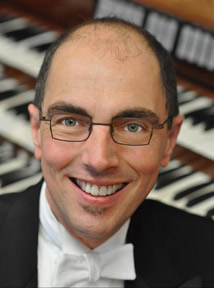Addressing the audience between pieces, organist David Higgs explained the conundrum facing builders of his chosen instrument: the organ has been around for nearly a millennium, and both the instrument and the music played on it have changed continuously and drastically during that time. It seems preposterous that a single contemporary instrument could serve up all of those sounds with anything like authenticity.
“But,” said Higgs, “one organ can play all that music well, IF it is beautiful.” He waved his hand at the Fisk Opus 82 behind him. “And this one certainly is.”
I’ve had the pleasure of hearing dozens of performances at Greensboro’s Christ United Methodist Church, and of reviewing a few of them. Forgive me for repeating myself, but the Fisk Op. 82 is a masterpiece. When great recitalists are drawn to CUMC, audiences have two entities to thank: Music for a Great Space with all of its donors and administrators, and the Fisk organ itself.
Resident organist André Lash prepared the audience for Higgs by recalling the buzz he created during his first featured appearance at an American Guild of Organists Convention. “His playing was so exciting and revealing,” remembered Lash.
Those descriptors applied equally well to Higgs as a speaker. This consummate musician was warm and generous with his audience, offering listeners an enlightening context for each piece.
Higgs began with Dietrich Buxtehude’s Toccata, BuxWV 156. His playing was immaculate, and so was the Fisk: its sparkling and breathy plenum and rich 16′ pedal reed sound quite at home in the North German repertoire. Higgs also made a convincing argument for a pastoral narrative interpretation of BuxWV 156, citing the classic tropes of 12/8 time and key of F.
The major work of the first half was Bach’s variations on “O Gott, du Frommer Gott,” S.767, which saw Higgs at his most registrationally creative. Armed with verses from the Lutheran chorale that provides the theme, Higgs treated each variation with great attention to symbolic detail. One sound deserving special mention was a sesquialtera or cornet combination (both nasal, piquant registrations using “mutation” stops which emulate partials in the overtone series). This isn’t a particularly rare sound in the organ palette, but Higgs produced a striking effect by using it in the tenor register, where the individual overtones coloring the timbre begin to be heard clearly as discrete pitches. The result was mournful and unsettled, but also achingly beautiful.
Higgs began the second half with a very welcome change of program: rather than the listed work, he would play Marcel Dupré’s Variations sur un Noël. This extraordinarily colorful and difficult piece uses the modal theme often set in English as “Sing We Now of Christmas.”
If Higgs’ Baroque interpretations were “exciting and revealing,” his 20th-century-French playing was astonishing. The frequent canons and finger-tangling chromaticism did nothing to deter Higgs from an elastic, dancing performance. The Fisk went right along with him, answering the challenge of replicating Dupré’s beloved Cavaille-Coll instruments with rich foundations, alluring strings, and fiery reeds.
Closing the program was what Higgs rightly characterized as one of the great masterpieces of the repertoire: Maurice Duruflé’s Suite, Op. 5. The performance was overwhelming. Despite the length and difficulty of the piece, both organ and organist seemed to blossom into their finest state, crystallizing in response to the sheer magnitude of the music they were producing.
The audience, on its feet, brought Higgs back out to the stage twice. The ever-gracious musician granted us a final treat in the form of Johann Christian Kittel’s Prelude in E-flat. Played on a single flute stop, this delightful little piece relieved the tension of the huge recital and set an atmosphere of joyous contentment.
A great organ, great music, and a great musician – this is what Music for a Great Space is all about.
Author’s note: I’d like to dedicate this review to the memory of my former organ teacher, Bobby King, who passed away in 2016. King was a student of Maurice Duruflé, Marie-Madeleine Duruflé, and Jean Langlais, and he passed his love for and knowledge of the French organ repertoire on to generations of American students.











